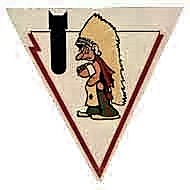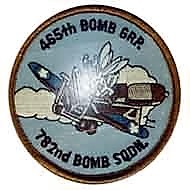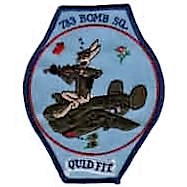History
The Year in Italy
A Brief Summary
Prepared by
Lt. Col. William F. Day
"In April 1944, when the 465th Bombardment Group (Heavy) came to Italy, the Fifteenth Air Force was rapidly approaching full strength. The job ahead was already becoming clear. The primary job was to destroy Germany's Air Force, then to deprive her of her most vital and most vulnerable resource, OIL, and in the process to hamstring at every opportunity her railways.
A good start on driving the Messerschmitts and Focke-Wulfs from the air had been made during the now famous "Big Week" in February, but there still re-mained many aircraft factories and air facilities to level, and the enemy's oil production had as yet received only minor damage.
At the start of the operation the enemy was a fully armed, highly ex-perienced, and deadly foe. German, Rumanian, Hungarian, and Fascist fighters were up in strength opposing nearly every attack. The enemy was well aware of his vulnerable spots and did everything in its power to protect these targets with large concentrations of fighters and heavy anti-aircraft guns.
On the first attack on 5 May 1944, a German Headquarters at Podgorica, Yugoslavia, the Group set the pace for the operations to follow. It was designed to destroy and kill — and this it did starting with 500 Germans (according to ground reports). The Group, after its freshman mission, plunged into battle with the older groups, heading out day after day for such targets as Ploesti, Wiener Neustadt, and Munich whenever weather permitted.
By early summer the German aircraft industry had received blows so crippling that full attention could be turned to oil. One by one the great refineries of the Germans felt the weight of our bombs: Ploesti, the scattered refineries of Hungary, Blechhammer, Vienna with its seven refineries, Poland and Czechoslovakia, France and Yugoslavia.
The enemy, with its highly mobile army, great masses of aircraft, tanks, and submarines, needed vast quantities of oil. To augment what it was using from occupied countries, great synthetic plants were built. Batteries of flak to protect these targets were of large caliber and used in enormous quantities. Blechhammer and Brux, for example, each had more guns than the entire city of Munich, itself a vital communications and manufacturing center.
By winter, when crippling blows had materially halted the production of oil and the fighters which for many months had regularly attacked our formations were no longer airborne, the deadly flak continued to be a menace, and accounted for more of our losses than any other cause.
Throughout the year, railroads, presenting so many targets, could often be hit when other targets were weathered in, and were the most frequently attacked.
Fighter attacks had ceased entirely (for this Group) after 6 December 1944. By March the production of oil had stopped at every refinery in range of the Fifteenth Air Force. In all some 56 percent of the entire German and satellite system had been destroyed. Rail traffic was in a state of chaos. Thousands upon thousands of locomotives and rolling stock and several hundred marshalling yards lay idle — a shamble of twisted steel and burned out wreckage. Gone too was the last hope of the enemy, jet-propelled aircraft, as these were bombed and strafed on their own fields. During April, the final advance by the ground forces ended the Strategic War.
The last operations of the Group were in direct support of the 5th and 8th Armies. These armies were poised below Bologna for the last battle in Italy and received magnificent support when thousands of tons were dropped on the German front lines, often within a half mile of our forward troops. The Germans in Italy, "out of gas", out of supplies, low in morale, were shattered remnants of a great army and suddenly it was ended.
The results of the 465th Group were outstanding. In the pre-invasion bombing of Southern France new bombing accuracy records were established, and throughout the year it continued in the upper brackets. The Unit held up its end in the attacks against fighters, accounting for 67 destroyed in the first six months of operations. In conjunction with the other groups of the 55th Bomb Wing, it knocked out six oil refineries on the first and only attack, stopped production four times at the Blechhammer refineries and made a total of 45 attacks against oil installations — most of them exceptionally effective. In three attacks against pilotless and jet aircraft works the manufacturing facilities were completely demolished.
To the ground personnel must go credit for the part they played so well, for besides the good record against the enemy, the Group has maintained its enviable safety record so well established in the early days of training. Almost 10,000 hours of training were flown without accident. The Group has the best safety record in the Fifteenth Air Force and not one fatal accident has been traced to maintenance, certainly a record in itself, and one in which these men responsible can take great pride.
All in the Group have done their jobs well; twice the Group earned a
Distinguish Unit Citation and heaped destruction on the enemy in
Strategic Air Warfare. The far-reaching results of such warfare
are not always apparent to the men who wage it, thus it is with pride
that we quote Germany's Marshal Gerd von Rundstedt, "The systematic
destruction from the air, coupled with the lack of fuel and raw
materials, was the principal reason for Germany's defeat.’"




